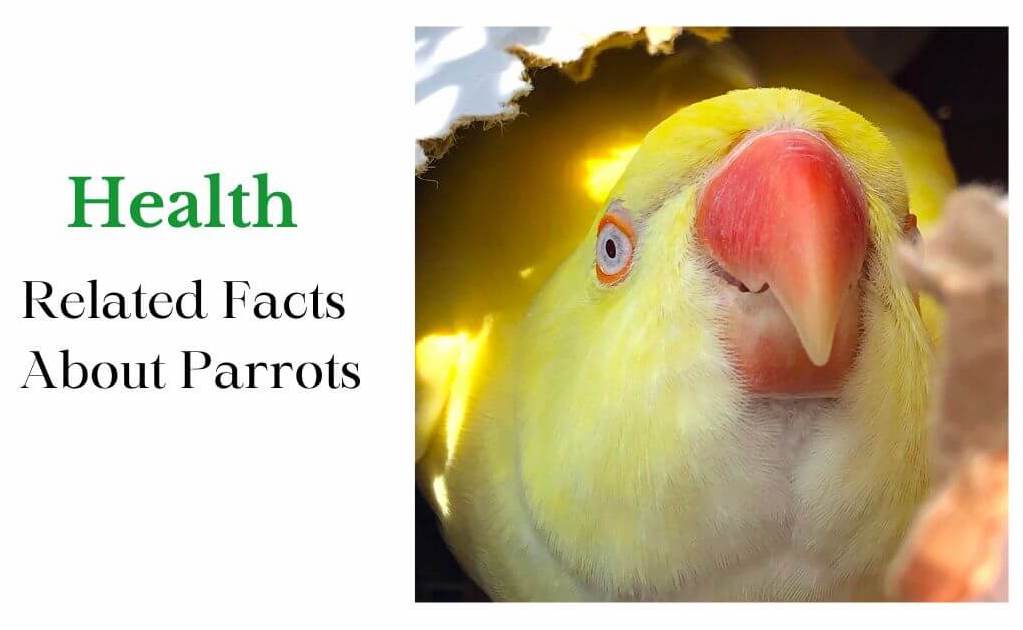
14 Health Related Facts About Parrots
Parrots are fascinating and intelligent birds with unique characteristics. Here are some health-related facts about parrots:
-
Diet and Nutrition: A balanced diet is crucial for a parrot's health. They should be provided with a mix of high-quality pellets, fresh fruits, and vegetables. Some parrot species, like the lorikeets, have specialized dietary needs, requiring nectar and fruits as a significant part of their diet.
-
Water Consumption: Parrots need access to clean and fresh water at all times. Dehydration can lead to serious health issues.
-
Exercise: Regular physical activity is essential for a parrot's well-being. They should have ample space to fly and play.
-
Social Interaction: Parrots are social creatures and require regular interaction with their owners or other birds. Loneliness can lead to behavioral issues and health problems.
-
Mental Stimulation: Intelligent and curious, parrots need mental stimulation. Providing toys, puzzles, and opportunities for problem-solving can keep them mentally active and prevent boredom-related behaviors.
-
Grooming: Parrots groom themselves, but they may also need assistance in maintaining their beaks and nails. Regular veterinary check-ups can help address grooming needs.
-
Respiratory Health: Parrots are sensitive to airborne pollutants and toxins. Avoid exposing them to cigarette smoke, aerosol sprays, and other pollutants that can harm their respiratory system.
-
Temperature Regulation: Parrots are sensitive to temperature changes. It's important to keep their environment within a suitable temperature range and protect them from drafts.
-
Avoid Toxic Substances: Parrots should be kept away from toxic substances such as certain houseplants, certain types of wood, and non-stick cookware, as exposure can be harmful.
-
Regular Veterinary Check-ups: Routine veterinary check-ups are crucial for detecting any potential health issues early on. Parrots are known for hiding signs of illness, so regular exams can help ensure their well-being.
-
Quarantine for New Birds: Introducing a new parrot to your existing flock should be done cautiously. Quarantine new birds to prevent the spread of diseases.
-
Beak and Nail Care: Some parrots, particularly species like cockatoos, may suffer from beak and feather disease. Regular vet check-ups can help address any issues related to their beaks.
-
Toys and Enrichment: Keep your birds mentally stimulated by providing a variety of toys and enrichment activities. Rotate toys regularly to keep things interesting. Birds enjoy toys they can chew, shred, and manipulate.
-
Proper Cage Size: Ensure that your birds have a spacious and appropriately sized cage. They should be able to move around, stretch their wings, and have room for toys and perches.

Remember, the specific needs of a parrot can vary based on its species, age, and individual health conditions. It's essential to research and understand the specific requirements of the parrot species you own to ensure they lead a healthy and happy life.
More Articles on Bird Health
Will apple seeds kill my birds
Vitamin A Deficiency in Parrots
Vitamin D Deficiency In Our Pet Bird
Monika Sangar, MSc – Molecular Biology | Avian Nutrition Specialist | Founder: PDSnonprofit | Owner: Pds Parrot Shop
Monika Sangar is a parrot rescuer, bird food chef, and toy designer with over a decade of experience in avian care and nutrition. She is the founder of Prego Dalliance Sanctuary and the author of The Science of Avian Nutrition, a cookbook dedicated to fresh, healthy meals for parrots. Explore more bird care tips and bird toys at PDS Parrot Shop!

